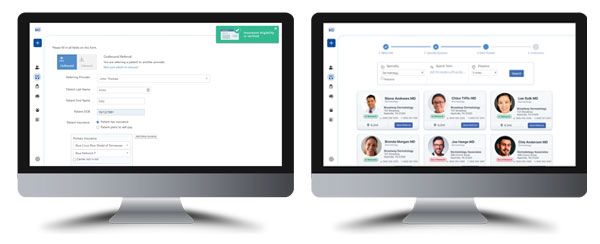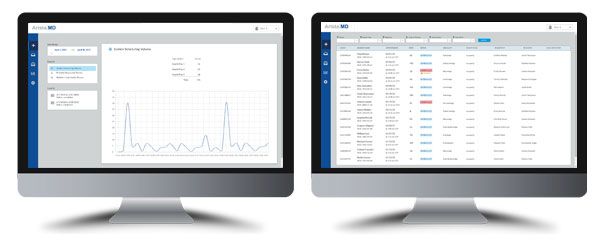
We discuss the patient engagement solutions providers need to succeed in value-based care payment models. In this series, we will also discuss the range of tools and strategies to succeed in value-based care arrangements, including:
- Low-lift Technology
- Care coordination tools
- Patient engagement
- Analytics and reporting
Healthcare Analytics and Reporting
Physicians can use healthcare analytics to identify patients at risk for certain conditions, allowing them to proactively manage those patients and improve outcomes. Healthcare analytics also help physicians track outcomes and measure the cost savings associated with their interventions. Physicians need access to data on referrals to specialists to ensure they are:
- Making evidence-based decisions that will improve patient outcomes
- Addressing chronic and emerging conditions using tools that support diagnosis and treatment in the primary care setting
- Expediting specialty care referral
With better analytics and reporting, physicians can also identify barriers to care and work to overcome them, leading to more effective care coordination.
In addition to helping physicians provide better care, analytics can also improve the bottom line for healthcare organizations. By reducing unnecessary procedures and specialty care visits, health plans, health systems and practices can save money and increase revenue over time. Moreover, analytics can help physicians and healthcare organizations identify which care setting is appropriate for the patient and coordinate appointments to ensure patients receive that care.
Analytics also help physicians track outcomes and measure the cost savings associated with their interventions. In particular, physicians need access to data on referrals to specialists to ensure they are making evidence-based decisions that will improve patient outcomes. Through better analytics and reporting, physicians can also identify barriers to care and work to overcome them, leading to more effective care coordination.
AristaMD Provides Healthcare Analytics and Reporting to Support Value-based Care
With a platform that assists providers in the selection of the appropriate care setting, AristaMD offers insights to:
- Identify care gaps
- Drive in-network referrals
- Evaluate patient compliance
- Close the care loop
Identify Care Gaps
With simple questions to help identify which patients can receive specialty care advice without a face-to-face appointment, our solution helps primary care providers offer diagnosis and treatment in the primary care setting. Electronic physician-to-physician consults help PCPs avoid time-consuming research on common conditions related to more than 70 specialties and subspecialties.
These specialist consults are offered in a secure, HIPAA-compliant environment and returned in about 4 hours. AristaMD users (physicians, nurse practitioners and physician assistants) report that advice from an eConsult specialist influences their patient care plan more than 90% of the time and replaces more than 70% of face-to-face specialist visits.
Analytics and reporting within the system allow you to review the number of eConsults requested per provider and the most common specialties requested for eConsult. This information enables your practice to optimize eConsult use to drive better-informed treatment plans without needing referrals.
The platform can also reveal when an in-network specialist is located far from the patient, so you can decide whether to perform an eConsult to minimize travel, which often leads to lower patient compliance.
Drive In-network Referrals
Keeping patients in-network when they need to see a specialist is critical to managing costs. The AristaMD care transition platform helps your referral coordinators keep patients in-network.
- Verify the patient’s insurance in real-time to confirm, enabling the platform to display in-network specialists.
- Select the specialty and subspecialty required to avoid routing the patient to a specialist without the required subspecialty — preventing delays in care.
- View and select in-network specialists that are convenient for the patient with visibility to the distance of in-network specialists to the patient’s home.
- Select and send all the appropriate paperwork to the specialist online in as little as 90 seconds — helping your patients secure an appointment sooner.
Verify Insurance and Find a Nearby In-network Specialists

Evaluate Patient Compliance
A common challenge for clinics is confirming the patient schedule an appointment with the specialist and attended the visit. AristaMD provides tools that help you select a nearby, in-network specialist for your patient. And the platform also helps your referral coordinators confirm the appointment is scheduled, track that the patient attended the appointment and receive the diagnosis and treatment plan from the specialist.
Simple reporting and analytics reveal the status of each patient referral. Staff can schedule follow-up tasks, assign tasks to other team members and communicate with the specialist’s office — all within the AristaMD platform. These features help your practice intervene when a patient fails to show up for an appointment. Use reporting and healthcare analytics to flag patients that have not scheduled or failed to attend a specialist appointment before their symptoms exacerbate to minimize poor outcomes and prevent visits to the emergency department.
Close the Care Loop
Viewing and documenting the treatment plan recommended by a specialist is always easy with eConsults. Since the primary care provider reviews the advice provided by the eConsult specialist, the hassle of care coordination is minimized. AristaMD allows PCPs to send follow-up questions, additional diagnostic information or changes in the patient’s symptoms back to the original eConsult provider. The platform automatically routes these changes to the consulting specialist when a new eConsult is initiated. Primary care physicians and specialists communicate about the same patient and condition about 15% of the time. In addition, multiple eConsults are requested for approximately 17% of patients r
AristaMD analytics offers you the ability to see how many eConsults required follow-up communication. On average,
For patients referred for a face-to-face visit, staff at the specialty care provider can return the visit notes, diagnosis and treatment plan back to the PCP inside the platform. The reporting functionality allows your practice to review where each referred patient is in the referral process:
- Referral sent
- Appointment scheduled
- Appointment completed
- Diagnosis and treatment plan received
Practices can also use these tools to see which specialists receive the most referrals and which PCPs are sending the most referrals. Analytics tools also allow the practice administrator to see the referrals by specialty.
Review and Track eConsults Usage and Referral Status

Transitioning to value-based payment models is a complex process, but improving the quality of care and reducing healthcare costs for patients is necessary. To make these transitions seamless, primary care physicians are accessing solutions that integrate with their EHR or operate independently of integration, allowing faster adoption of technology without a significant IT investment. The healthcare analytics and reporting within AristaMD’s platform allow the practice to confirm the value of eConsult and referral management tools before allocating the time to integrate.
AristaMD web-based application is designed to get your practice focused on managing costs while improving patient outcomes. By adopting better analytics and reporting practices, primary care physicians and healthcare organizations can improve the quality of care they provide and save money in the long run.
With value-based payment, providers receive incentives for improving patient outcomes and reducing healthcare costs, ultimately benefiting patients. However, transitioning to a value-based payment model is not an easy process. Primary care physicians need to play a more active role in coordinating care for their patients, which can lead to increased workload and higher risks. This is why it’s important for primary care physicians to have better analytics and reporting on referrals — avoiding unnecessary referrals with eConsults and routing necessary referrals to in-network specialists.
